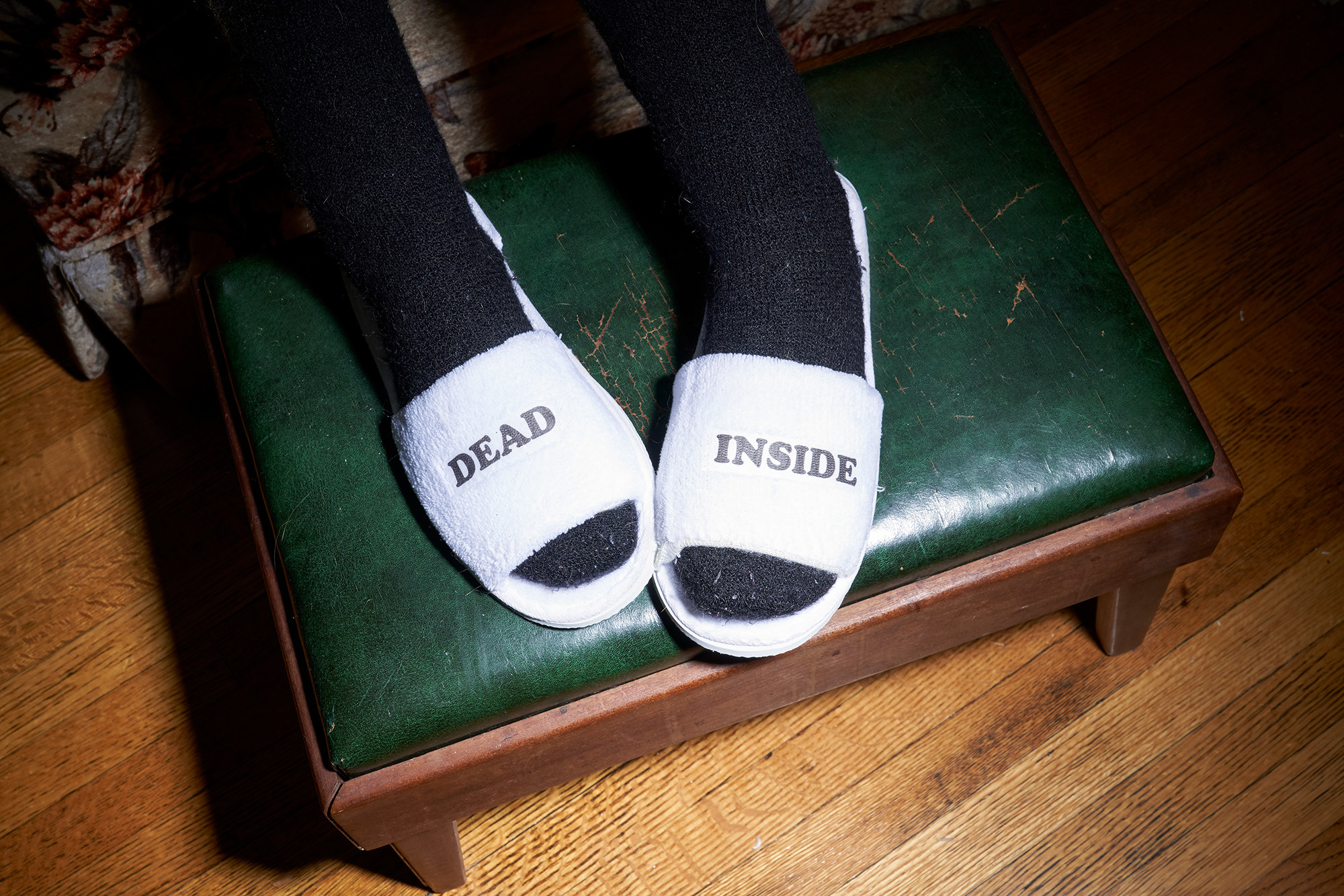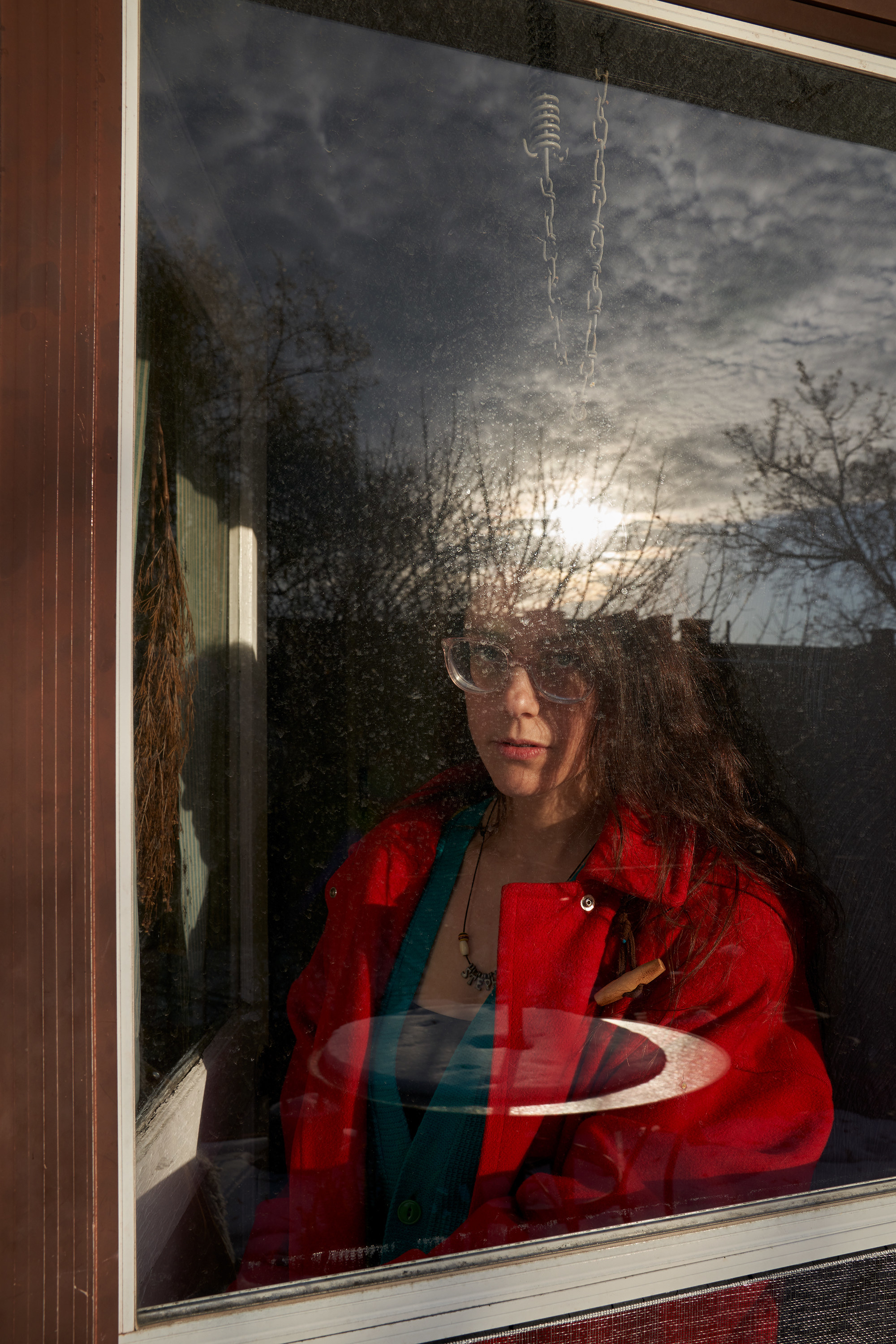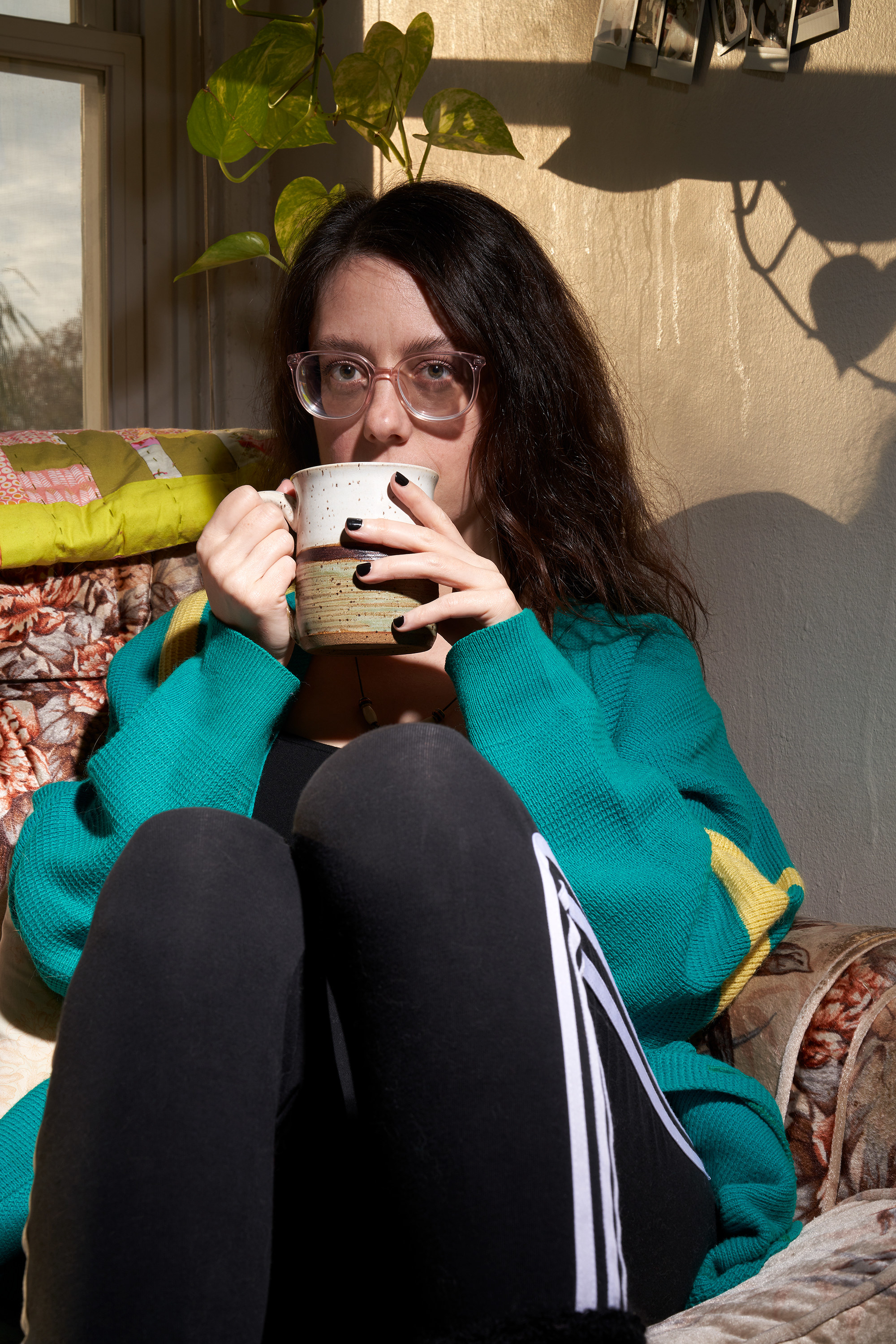
In 2016, Steph Guthrie and I were both a little too infamous online. We recoiled from the internet and waited for the commotion to boil down. At the time, our mutual friend Amy took a photo of us hugging at a party and posted it on her private Facebook page with a caption that succinctly captured our public personas: “I only hang out with internet fugitives.”
I had gotten myself into a mini Canadian scandal after some tweets I posted looking for writers to contribute to BuzzFeed News landed me in a few newspapers. But Guthrie was a much bigger deal: She was one of the complainants in what would end up being Canada’s landmark Twitter harassment case.
In 2012, then-27-year-old feminist activist Guthrie told Toronto police that local artist Gregory Alan Elliott had been harassing her online. (Elliott did not respond to our request for comment on this story.) He tweeted incessantly at her, calling her (and other women) a bitch, and making crude comments about women’s bodies. Two other Toronto women, Paisley Rae and Heather Reilly, reported him to the police for similar behavior in 2013. Rae’s case was dropped; Guthrie and Reilly’s cases made it to trial after Elliott was charged with criminal harassment. If found guilty, Elliott, then 52 years old, faced a maximum of 10 years in prison.
Guthrie was one of three complainants, but she was easily the most visible one. (In full disclosure, she’s my friend, too.) The case was supposed to be a precedent-setter in Canada; it was the first of its kind, a criminal case that entirely hinged on tweets and whether they could reasonably make a woman afraid. A Canadian precedent would have little effect on American law, but the case offered valuable insight into how a court viewed the rampant issue of online harassment. (A 2021 Pew Research Center study said that women were far more likely to be sexually harassed online or stalked. Young women in particular felt the effects: 61% of women say online harassment is a big problem, compared to 48% of men.)
The case could have changed the cultural understanding around online harassment. Instead, Elliott was acquitted by a judge in 2016. The trial took two long years — a pretty typical timeframe for a high-profile criminal harassment case in Canada.
The trial confirmed that Twitter would do little about these kinds of tweets and that Canadian courts would also be just as inactive. For Guthrie, the trial was a public lashing, a punishing way to discover that a man can say whatever he wants to you — and about you — online, and you either have to tolerate it or be the one willing to walk away for good. “I did the thing that everyone tells you to do when you’ve tried everything and it hasn’t worked, and I went to our friendly neighborhood police officers,” she told me. “I don’t understand the let-the-courts-decide people. Look around you. It’s not working.”
Now 38, she is just starting to emerge from the cocoon she made for herself after the trial ended. This is the first time Guthrie has spoken in any significant detail about the case. As the complainant, it wasn’t really her trial, but the way it was covered made it seem like she was leading the charge, a representative of a larger debate she maybe never wanted to be a part of in the first place.
It’s been more than a decade since Guthrie and Elliott initially crossed paths as possible professional collaborators, and almost seven years since he was acquitted. Over the course of three interviews conducted throughout 2022, she relayed that she has slowly started to grapple with the trial and its outcomes. “Every word that I uttered was scrutinized and creatively interpreted,” she told me last September. “People are going to have preconceived notions of me and they are going to take my words and have them fit whatever idea of me they’re already carved out for themselves. But I can’t let go of my desire to control that.”

Her life has been shaped by the trial — most saliently, by how she lost, and how much she lost. “There’s something so isolating about the court process and about being written about and talked about,” she said. “You’re an atom. There’s nobody who can really be inside of that with you.”
Guthrie still lives in Toronto, in a second-floor walk-up in the city’s West End. After the trial, Guthrie’s friend gave her some advice. “Through social media and through my constant media hits, I was putting little bits of pieces of myself out there in a constant stream,” Guthrie said. “[My friend] was like, ‘What I think you need to do is go inward and take your time and then put bigger pieces of yourself out there.’” Guthrie ended up taking years away, her work and personal lives both shifting offline. There was a time when people in the Toronto social politics scene couldn’t go a few days without seeing her name online; now, you barely hear about her at all.
Meanwhile, Twitter boomed. Alongside this growth raged an argument between self-styled free speech absolutists (many of whom just wanted to be able to broadcast racist, sexist, anti-trans, and otherwise hateful sentiments) and people who yearned for Twitter to take real responsibility for moderation. “The point of harassment is to shut women up, either by self-censorship through fear or by driving them away from Twitter,” Debbie Chachra wrote in the Atlantic in 2017. “The specific affordances of Twitter make it powerful — it can amplify marginalized voices but it can also amplify harassment.”
Guthrie said an “argumentativeness” prevailed on the platform. And its permissive atmosphere exposed its public users to anyone who had an opinion, seemingly no matter how noxious. “There’s a kinship to the legal system, this idea that you owe somebody an argument,” Guthrie said. Sure, you could abstain from engaging, but it doesn’t always feel right to stay silent in the face of insults and falsehoods. “If you run away from the argument, it must mean that you’re wrong,” she added.
The case is now a time capsule of the dominant ideology around online harassment at the time. Even now, she’s sometimes asked why she didn’t just suck it up and deal with it. “To them I would say: Fuck you,” she said. “How about I send someone your way to tweet at you? Let me insert myself everywhere to drown out every conversation that you’re ever trying to have?”
“[Twitter] remains both a vital force for free expression on the web and yet also a cesspool of hate, abuse, and harassment,” the Verge wrote in 2017, just after its 10th birthday. “The company remains in a constant struggle for its soul against malicious trolls, harassers, and foreign government propaganda machines.” These days, things are even worse. Under Elon Musk, hate speech on the platform is hitting unprecedented highs. (Antisemitic posts, for example, have jumped 61%.) Never forget: In 2015, instead of implementing more stringent measures against racist or sexist invective, Twitter changed the “favorite” symbol from a star to a heart.
Guthrie cried sometimes when we spoke about the trial, especially when we talked about how much her internet presence has changed. She lurks online but uses her voice far less. She has never fully returned to Twitter — her account is private, and her last tweet is from spring 2021. She used to think of herself as an optimist, but not anymore. “You can call it an injustice, and it is, and you can call it whatever words signal at the systemic implications of it, but it’s also a hurt. To you, as a person,” she said. Hanging on her living room wall is a piece of art gifted to her during her trial, a slogan drawn in bubble letters. “I miss,” it says, “when the internet was just a thing I did with my friends.”

Guthrie and Elliott first met when she reached out to him to design a poster for one of her grassroots feminist organizations. They didn’t end up working together on the project, but he continued to follow her online.
Back then, most Torontonians knew Guthrie as a somewhat famous internet feminist; she hosted events for Drunk Feminist Films, a movie series where attendees would drink themed cocktails and scream at the screen every time a man said something that sucked. (I used to be one of the cohosts.) She gave TED Talks about trolling and worked in campus outreach about sexual violence.
In 2012, men’s rights activist Bendalin Spurr allegedly made a video game where users could assault an avatar of the media critic Anita Sarkeesian, who had been the subject of online attacks after she announced she was making a video series called “Tropes vs. Women in Video Games.” (Gamergate, the misogynistic harassment campaign, kicked off soon after.) “So I found the Twitter account of that fuck listed as creator of the ‘punch a woman in the face’ game,” Guthrie tweeted. “Should I sic the Internet on Him?” MRA accounts started hurling cruelty toward her. Elliott was among her reply guys. (His tweets to Guthrie continued until she reported him to the police; among his many bail conditions, he was not allowed to access his Twitter account and his phone could not have a data plan or any internet capabilities through to the end of the trial.)
As of this writing, Elliott’s Twitter account is suspended (not for the first time). A lot of women in Toronto found his online presence unnerving. His tweets were oddly intimate and erratic, either aggressively flattering or argumentative and rude. After Guthrie blocked him, he got worse. According to a 2016 Slate article, “Over the course of several months, he called Guthrie and company ‘cunts’ and ‘bitches’” and “lewdly ridiculed Reilly’s ‘fat ass.’” Guthrie said that when she asked him to stop, he did not. She said that she didn’t attempt to report him to Twitter because the platform only recognized violence, clearly identifiable slurs, or direct threats as harassment. “What scared me about his behavior wasn’t so much the content of his tweets as it was their volume and persistence,” she said. “Twitter’s policies weren’t really built to mitigate that type of behavior.” (Twitter did not respond to a request for comment.) Instead, she blocked him, but he was still able to view her public account when he logged out, and he then moved on to use hashtags associated with her work or her organizations.
“It continued for months,” she told me. “There just came a point where I was like, Am I supposed to endure this forever?”
“There just came a point where I was like, Am I supposed to endure this forever?”
The trial started in January 2014. It was exhausting, especially because it seemed that the judge, Brett Knazan, didn’t entirely understand how Twitter worked. When Guthrie crowdsourced the funds to buy transcripts of the case, she discovered pages upon pages explaining and contextualizing internet-speak — two full pages are devoted to what the 😝 emoji signifies. It is, suffice to say, cringe.
Two years later, Knazan released an 88-page decision in Elliott’s favor. Knazan agreed that Guthrie’s fear of Elliott was legitimate, but he didn’t agree that her fear was reasonable. “Had there been anything in the tweets of a violent or sexual nature or that indicated the irrationality that Ms. Guthrie perceived, that would support a fear of danger on the basis that he would be capable of anything,” he wrote. Despite the fact that Canadian law doesn’t require behavior to be sexual or directly threatening to constitute harassment — the complainant’s fear just has to be “reasonable” — Knazan ruled that Elliott’s tweets didn’t constitute criminal harassment. (Through a representative of the courts, Knazan declined to comment on this story. The Crown counsel, otherwise known as the lead prosecutor, Marnie Goldenberg, did not respond to my repeated requests for comment.)
Knazan also dismissed the charges against Guthrie’s coplaintiff, Heather Reilly. He said that because Reilly had responded to Elliott — sometimes rudely, and once retweeting someone who suggested Elliott was a pedophile — it showed “there is no suggestion of fear in her communication.”
For Guthrie, the verdict came down to whether you could be fearful of a man online without a direct violent or sexual threat. For Reilly, it came down to whether you can be legitimately afraid of someone while simultaneously telling them off. (Reilly could not be reached for comment.) Most women know that such a dichotomy is very possible and perfectly reasonable — especially online, since Twitter is notorious for doing very little about online harassment. “How many tweets did I get from people saying they could smell my stinky cunt, or that they wanted to cut my tits off and feed them to me, or [tweets with] doctored pornography?” Guthrie said about Twitter communication she received during and after the trial.
The defense argued that Guthrie should have sought other ways to stop Elliott’s harassment. “One of those steps [was] just, don’t engage him. Don’t taunt him,” Chris Murphy, Elliott’s defense attorney, told me over the phone last November. “They’re voluntarily using the platform, and Mr. Elliott is not violating the terms of the platform.” Murphy said that Guthrie could have brought a civil suit or sought a peace bond (Canada’s version of a restraining order) — although one of the charges against Elliott was already related to breaching a peace bond.
Murphy said that Elliott lost his job and had been barred from using the internet between the time of his arrest and his acquittal. The potential consequences of a guilty verdict were severe, with a possible decade of prison time on the line. “This went from [a] back and forth on Twitter to the most draconian remedy there is,” he said.
Meanwhile, if you look up Guthrie’s name on Twitter or YouTube, you’ll still find a steady stream of men demanding that she be sued for libel, or jailed, or physically harmed for her allegations against Elliott. In these responses to Guthrie, you can see flashes of how people have reacted to Amber Heard or Megan Thee Stallion, women who also used the court system to seek protection — and instead received abuse from strangers. “I still feel afraid that a defamation suit will be brought against me,” she said. “When you have hundreds of people saying this should be done to you, and when you’re watching Johnny Depp do it to his ex-partner, and you’re watching Marilyn Manson do it to his ex-partner, I know we’re going to see a lot more men using this tool. It’s having this level of visible success.”
“I have significant sympathy for Ms. Guthrie, but that doesn’t mean the judge got it wrong,” Murphy told me. “If you don’t want to use Twitter, don’t use Twitter.”

Guthrie spent a few days in court, in January, June, and July of 2014. “There’s a sort of dissociation because you have to continue living your life, to some extent,” she told me. “My part-time permanent employer made me use vacation days to testify.” At the time, she was working in advocacy for a women’s rights organization in Toronto. “I know,” she said, shaking her head. “You have to fuckin’ laugh.
“I just don’t remember the nights after I would testify,” she said. Sometimes things didn’t feel clear because she was in a haze; other times, she was drinking, just to take the edge off being a main character, both on and offline.
During the trial, Guthrie became the target of conservative stalwarts both in Canada and stateside, but no one was more fixated than Postmedia’s Christie Blatchford. Blatchford was Canada’s most prolific courts columnist up until her death in 2020, but she also wrote cruel, often inaccurate screeds about people she didn’t agree with. Infamous — to me, at least — was her 2011 column titled “Toronto, City of Sissies,” all because she saw two boys hug. In a post from May 2014, she called Guthrie “a tough cookie with the big nuts to post her opinions for the world to see.” In another column, published in 2015, she fretted over what would happen to free speech if Elliott lost. “Elliott’s chief sin appears to have been that he dared to disagree with the two young feminists and political activists,” she wrote.
“Christie Blatchford published her blockbuster column and blew my life up. I woke up the next morning to thousands of men’s rights activists saying horrible things to me,” Guthrie said. “The column got picked up by InfoWars and Breitbart and all the American deranged right-wing bukkake media.” From there, Guthrie became a symbol of a movement, not an individual person.
The trial also painfully touched on other traumas she was still working through. “My father was in and out of jail when he was a young man; it fucked him up for life,” she said. This family history made Guthrie’s relationship with the carceral system complex — she hadn’t really wanted to use it. “I honestly just wanted [Elliott] to leave me alone,” she said.
Guthrie was sexually assaulted in her 20s, and memories of the assault resurfaced because of the trial and the resulting online abuse from total strangers. In 2017, Guthrie helped produce A Better Man, a documentary featuring a woman’s interviews with an ex-boyfriend who physically and emotionally abused her for years. Working on that project helped her connect the dots between the men in her life who had harmed her. “There’s so many people out there who I’m sure will be thrilled to hear me draw these connections because they’ll be like, Oh, well, she just had daddy issues,” she said. “That’s one explanation. The other possibility is just that a lot of people do terrible, abusive things and a lot of the same motivations underpin those things.”
Guthrie’s case may not have set a legal precedent that would protect subsequent victims, but women do pay attention to how other women are treated when they speak publicly about how they’re treated. There hasn’t really been a comparable case like it in Canada or the US since, which is no surprise given how Guthrie fared. When I asked defense lawyer Murphy about whether Guthrie’s case had set an unfortunate precedent in Canada, he mentioned two cases that cited it, but those cases only reference the minor point of whether tweets legally constitute communication, which they do.
“You’re only a victim,” Guthrie said, “if they’re convicted.”
There’s another timeline in another universe where Guthrie just kept quiet, waited until Elliott lost interest, and the world moved on. Or another where she won, where the court understood how Twitter worked and Musk’s current arguments about free speech absolutism wouldn’t hold an iota of the weight they currently do. “Was it worth it?” she said. “Of course not, but what the fuck else was I going to do? Who I was at the time was someone who believed the system would do something. Embarrassing.”
But the trial radicalized her. “It undermined my faith in ‘democratic’ institutions: the courts, the media,” she said. “I think I needed to know those things. It shifted the focus of my energy.”
The trouble is that the court system deals with social issues rigidly and narrowly. The complainant and the defendant are stuck in amber. There’s no acknowledgment that someone caused harm or that there’s a bigger problem that needs to be addressed. “You’re only a victim,” Guthrie said, “if they’re convicted.”

Guthrie only truly reemerged online during the pandemic. In spring 2021, she debuted “Self Seeding” on Instagram, an art project where she gathered soil from different moments of her life and tried to grow something in it. Some of that soil came from the Toronto courthouse where she lost her case. On the planter, she painted several wide-open eyes. “Every time I sit down to write about the Courthouse, my brain tries to escape,” she wrote in the caption. Three big yellow flowers burst up from the soil. She clipped the petals and turned them into a salve that she raffled off for a donation to the Prisoner Emergency Support Fund.
Self Seeding tied together Guthrie’s life before the trial and the trial itself. In the caption about a plant she grew from soil gathered from her childhood home, she wrote about harm, and her father. “The Courthouse showed me you can’t compel accountability,” she wrote. “The trial taught me that you can follow every rule in the book and this system will still punish you if you’re the party with less power.”
Apart from that, Guthrie still lies relatively low on social media. Maybe she knows something that could be instructive for the rest of us who are struggling to let go. She has certainly rethought the value of the blunt exchanges that Twitter considers “engagement.” “I think trying to argue with a stranger is a waste of your energy. For some people, it is fun, it gives them a bit of a charge,” she said. “I don’t find it entertaining. It just sucks. It makes me really anxious.” Guthrie used to enjoy a Twitter roast as much as the next person, but now feels it has diminishing returns. “Twitter is the platform of dunks. It’s a confederacy of dunks,” she said.
I asked her if she felt free now that people have started to forget her name. “No,” she said. “I’m free-ish.” Guthrie says that a small army of Instagram accounts keeps harassing her online. Some of them pop up using stock images of women with feminist credos in their bios, as if that will trick her into giving them access to her private account. When she blocks one, another materializes. That, to her, is proof that people trying to rattle her isn’t specific to Twitter; it’s a problem everywhere.
Guthrie has changed; she’s far from the person she was the first time I met her almost a decade ago. She remains sprightly and good-humored most of the time, but it seems like a small cloud follows her almost everywhere.
“I am enduring it, because there’s nobody coming to save me,” she said. “No institution is going to help me with this. The only help I’m going to find is in the people around me who love me.” ●
